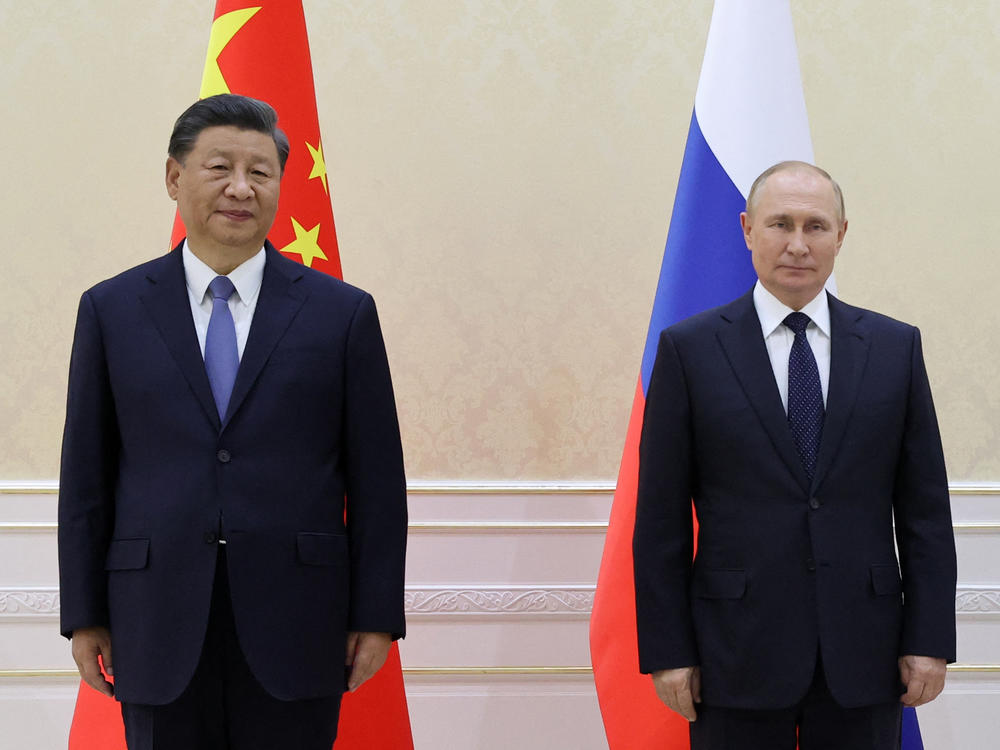Section Branding
Header Content
Xi Jinping travels out of China to see Putin and other leaders. Here's why it matters
Primary Content
Updated September 15, 2022 at 5:29 PM ET
Chinese leader Xi Jinping is on his first international trip outside of China for the first time in more than one thousand days.
Xi has chosen Central Asian countries as his first stops, after nearly three years of strict pandemic isolation within mainland China, and the Chinese leader also squeezed in a bilateral meeting with Russia's President Vladimir Putin on the side of a security forum meeting in Uzbekistan on Thursday.
Here are some of the reasons Xi is traveling abroad and the takeaways so far:
It's in China's regional and national security interests
Xi and Putin are in Uzbekistan to attend a meeting of the Shanghai Cooperation Organization, an eight-country security bloc dominated by China but which includes Russia, India, Pakistan and four former Soviet Central Asian republics. Iran and Afghanistan are among the observers of the organization. The bloc is primarily focused on cooperating on issues of regional security, anti-extremism, and anti-separatism — issues China insists are the reason for its crackdown on historically Muslim ethnic groups in its western region of Xinjiang.
The U.S. State Department estimates more than 1 million ethnic Uyghurs — who share close cultural and linguistic ties with the people living in the Central Asia republics, including Uzbekistan — have been detained or imprisoned without due legal cause in China. Among those detained were thousands of ethnic Kazakhs living in Xinjiang, further complicating China's relations with the region. Ensuring the continued cooperation of Central Asian countries like Kazakhstan, which shares a long border with Xinjiang, is key to China's vision of securing its borders and creating a buffer between it and unstable states like Afghanistan.
It's to push back against "U.S. hegemony" and Western dominance of global affairs
While Xi Jinping was sequestered within a strict COVID-19 bubble inside China, America's relationship with China tanked, and U.S. officials have aggressively pursued closer ties with Asia Pacific countries and with the democratic island of Taiwan, which China claims control over, to counterbalance China's rise.
After Xi met with Kazakhstan's President Kassym-Jomart Tokayev this past Wednesday, the two countries issued a joint statement supporting China's claim to peacefully unite with the island. "Recognizing that Taiwan is an inalienable part of China's territory, Kazakhstan opposes "Taiwan independence" in all forms," according to the statement.
Xi secured similar pledges from other Central Asian leaders and from Russia, as a diplomatic counterbalance to U.S. outreach on Taiwan.
"As Xi put it, we are at a crucial moment of the world order. The U.S. is used to being in the position of the world's leader, but China will not be kicked out as the second biggest world's influencer," said Wang Dehua, the former director of the Institute of South-Central Asia Studies, Shanghai Municipal Center for International Studies.
China is concerned about Russia's war in Ukraine, but not criticizing it
China invested significant political capital into a "no limits" partnership with Russia just weeks before Russian forces invaded Ukraine in February — and has since refused to criticize Russia's war in Ukraine. Now, with the war in its seventh month, Russia's prospects look increasingly tenuous after a series of stunning wins by the Ukrainian military last week that recaptured several towns and villages in eastern Ukraine.
Xi is now likely seeking assurances from Putin that Russia's war will not further destabilize regional security and economic development. Putin directly referenced China's apparent concerns in his remarks at the start of the bilateral meeting.
"We highly appreciate the balanced position of our Chinese friends in connection with the Ukrainian crisis. We understand your questions and concerns in this regard," Putin said. "During today's meeting, of course, we will explain in detail our position on this issue, although we have spoken about this before."
Xi's trip is also to reassure China's Central Asian neighbors after Russia's invasion of Ukraine
The post-Soviet Central Asian republics were rattled after Russia's invasion of Ukraine. Kazakhstan, normally a close partner of Russia, even adhered to Western sanctions against Russia and refused to recognize Moscow-backed self-proclaimed "republics" in eastern Ukraine.
Now, Central Asian countries like Uzbekistan are looking to China to take a more prominent role guiding regional affairs as Russia looks more unstable and distracted by its war in Ukraine.
"Every time Russia has conflict with the West and becomes more isolated and toxic, Uzbekistan understands it needs to replace Russia where it's possible, and the first country that can is China," says Temur Umarov, a fellow at the Carnegie Endowment for International Peace.
China has already invested heavily in energy and infrastructure in Central Asia, which Xi Jinping made the centerpiece of a global infrastructure initiative called Belt and Road, a reference to the ancient Silk Road caravan routes connecting China to Central Asia, the Middle East and Europe.
Aowen Cao contributed research from Beijing.
Copyright 2022 NPR. To see more, visit https://www.npr.org.

